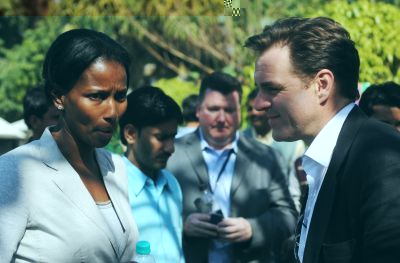Common touch draws big stars to India literary festival

Your support helps us to tell the story
From reproductive rights to climate change to Big Tech, The Independent is on the ground when the story is developing. Whether it's investigating the financials of Elon Musk's pro-Trump PAC or producing our latest documentary, 'The A Word', which shines a light on the American women fighting for reproductive rights, we know how important it is to parse out the facts from the messaging.
At such a critical moment in US history, we need reporters on the ground. Your donation allows us to keep sending journalists to speak to both sides of the story.
The Independent is trusted by Americans across the entire political spectrum. And unlike many other quality news outlets, we choose not to lock Americans out of our reporting and analysis with paywalls. We believe quality journalism should be available to everyone, paid for by those who can afford it.
Your support makes all the difference.From extremely humble beginnings, the Jaipur Literary Festival in India has grown in just five years into a major event that attracts star writers by resolutely refusing to treat them as such.
The inaugural festival in 2006 gathered just 18 authors - all Indian residents - who drew a crowd of around 100 people, a fair number of whom "appeared to be tourists who had simply got lost," according to the event's co-director, the writer William Dalrymple.
The 2010 event, currently under way in Jaipur in the western desert state of Rajasthan, boasts more than 200 writers and performers, including the Nigerian Nobel laureate Wole Soyinka, two Booker winners and five holders of the Pulitzer prize for literature.
More than 20,000 people were expected to have crammed into the packed venue of the Diggi Palace - a converted 19th century mansion in the centre of Jaipur - by the time the five-day gathering ends Monday.
The explosive growth of the festival - it now claims to be the largest and most prestigious of its kind in Asia - has been achieved despite offering invited authors no financial incentive nor pampering them in the manner to which many are accustomed.
"Some of the Americans can be quite demanding," Dalrymple said. "A good American author expects to be flown first class and bring an assistant, and we just say 'no, we don't do that'."
With no VIP "Green Room" to cosset star writers in the fashion of other literary festivals like Britain's Hay-on-Wye, the authors in Jaipur are expected to mingle, drink and dine with the crowds.
"It's just boisterous. I love it," said Tina Brown, the former New Yorker and Vanity Fair editor and a regular on the international festival calendar.
"The Hay festival has become such a huge enterprise now and it's sponsored to the point of being like Wimbledon or something. It's great but it's highly discovered. This still has a sense of being special," she said.
British writer Geoff Dyer, who gave readings from his latest novel "Jeff in Venice, Death in Varanasi," said Jaipur was unusual in providing a level playing field.
"In a more hierarchically organised festival, I'd always feel I was at the bottom of the pile and missing out on something," he said.
"Don't get me wrong, I like to rubberneck in the Green Room at Hay as much as the next person, but I like the way there's no Green Room here. It makes it a much more integrated experience."
Despite its exponential growth, the festival, which currently costs 550,000 dollars to organise, has never made a profit - partly due to its free access policy, and it almost went under in 2008.
Its saviour was an unlikely literary sponsor in the form of the Indian construction company DSC, which covers one third of the cost.
"I guess it's not very glamorous building flyovers, and this way they get their name out there," said Dalrymple.
While big-ticket, prize-winning authors have played a major part in raising the festival's profile, the organisers have remained loyal to their mission of promoting relatively undiscovered, non-English language Indian writers.
"For me this festival has to represent the plurality and diversity of India," said co-director Namita Gokhale.
"There was resistance. People couldn't understand that uncelebrated writers from an Indian language could hold their own against the so-called stars," she said.
The 2010 event has focused on writers from India's "untouchable" Dalit caste, who often command large sales but remain largely unknown - not only internationally, but also in mainstream Indian literary circles which are dominated by a metropolitan, middle-upper class elite.
For Ajay Navaria, a Dalit who writes in Hindi, the Jaipur festival provides a forum he is denied in the Hindi literary community which he describes as generally "caste-based, insular and feudal."
"Even in mainstream Hindi literary seminars and conferences, Hindi Dalit writers are often set aside," Navaria said.
"This festival is more democratic. My voice gets heard."
Join our commenting forum
Join thought-provoking conversations, follow other Independent readers and see their replies
Comments